

Plastic Breaks Down in Ocean, After All. August 20, 2009 Though ocean-borne plastic trash has a reputation as an indestructible, immortal environmental villain, scientists announced yesterday that some plastics actually decompose rapidly in the ocean.
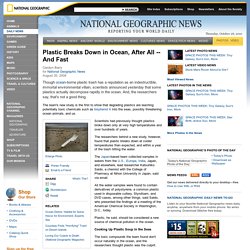
And, the researchers say, that's not a good thing. The team's new study is the first to show that degrading plastics are leaching potentially toxic chemicals such as bisphenol A into the seas, possibly threatening ocean animals, and us. Scientists had previously thought plastics broke down only at very high temperatures and over hundreds of years. Our Debris Filling the Sea. What do a tropical island in the Pacific Ocean and the Antarctic have in common?
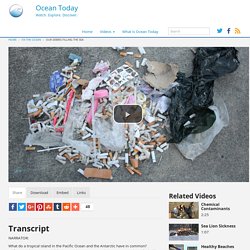
Unfortunately, it’s marine debris. Even the most remote locations on Earth are fouled by man-made garbage and cast-outs. And a majority of the debris that’s found comes from land-based sources. In one marine protected area off the Northwestern Hawaiian Islands, in just one month, 50 metric tons of debris was collected. That’s equivalent to 50 elephants worth of trash. And no matter what location it resides, it causes problems. There are no easy solutions to the worldwide problem of marine debris, but there are things you can do to help.
We can recycle more, volunteer to clean up coastlines, and give support to programs that are tackling the issue in creative ways. 19-Year-Old's Ocean Cleanup Array Could Clean Half the Pacific Garbage Patch in 10 Years, Study Shows. Last year we reported on teenage inventor Boyan Slat’s plans to create an Ocean Cleanup Array that could remove 7,250,000 tons of plastic waste from the world’s oceans.

His proposal for an anchored network of floating booms and processing platforms received a lot of criticism – but now, just over a year later, Boyan is back with the results of a year-long investigation that shows his invention does offer a feasible method to rid the world’s oceans of plastic pollution. In fact, he claims that a single array could remove half of the plastic in the Great Pacific Garbage Patch in just 10 years. The year-long study sought to determine if Boyan Slat’s array is indeed a feasible ocean cleanup method. Eco-Cleaning Company Ecover is Making Bottles Out of Recycled Ocean Plastic. Right now there are about 46,000 pieces of trash floating around in every square mile of the ocean, which is why Belgian company Ecover is now making their cleaning product packaging from plastic fished out of the sea.

Taking plastic right out of the ocean, the company then processes it into detergent and dish soap containers. They are calling their new product the Ocean Bottle in an effort to bring attention to the problem of plastic pollution in our precious waterways. Ocean waste is a major issue in all parts of the globe. Fish in the northern Pacific alone ingest up to 24,000 tons of plastic waste and every year at least one million sea animals die from ingesting sea waste. Once waste gets into the ocean environment, it can take thousands of years to degrade. Related: Even If We Stopped Polluting Today, Ocean Garbage Patches Would Linger For Hundreds Of Years + Ecover. Study Finds Rising Levels of Plastics in Oceans. Photo Some eight million metric tons of plastic waste makes its way into the world’s oceans each year, and the amount of the debris is likely to increase greatly over the next decade unless nations take strong measures to dispose of their trash responsibly, new research suggests.
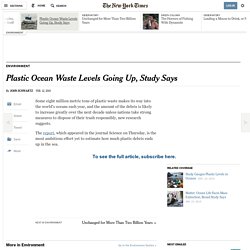
The report, which appeared in the journal Science on Thursday, is the most ambitious effort yet to estimate how much plastic debris ends up in the sea. Risks to Oceans. Gen_Plastic-hi_9-20-11_1.pdf. A Little Earth Day Trash Talk. By: NOAA Marine Debris Program Staff Let’s kick off this Earth Day celebration, with some “Trash Talk”!
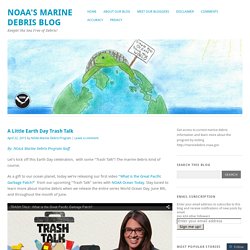
The marine debris kind of course. As a gift to our ocean planet, today we’re releasing our first video “What is the Great Pacific Garbage Patch?” From our upcoming “Trash Talk” series with NOAA Ocean Today. Stay tuned to learn more about marine debris when we release the entire series World Ocean Day, June 8th, and throughout the month of June.
Like this: Like Loading... Author: NOAA Marine Debris Program. MDPoster_LR. Marine debris is everyone's problem. Water Pollution Facts, Effects of Water Pollution, Clean Water Act. Clean and plentiful water provides the foundation for prosperous communities.
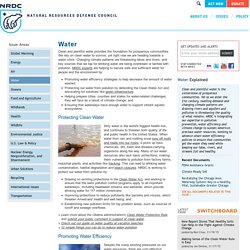
We rely on clean water to survive, yet right now we are heading towards a water crisis. Changing climate patterns are threatening lakes and rivers, and key sources that we tap for drinking water are being overdrawn or tainted with pollution. NRDC experts are helping to secure safe and sufficient water for people and the environment by: Promoting water efficiency strategies to help decrease the amount of water wasted;Protecting our water from pollution by defending the Clean Water Act and advocating for solutions like green infrastructure;Helping prepare cities, counties and states for water-related challenges they will face as a result of climate change; andEnsuring that waterways have enough water to support vibrant aquatic ecosystems.